

Embodied cognition. In philosophy, the embodied mind thesis holds that the nature of the human mind is largely determined by the form of the human body.
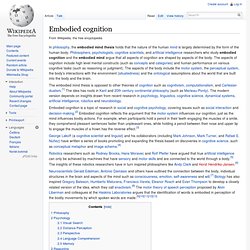
Philosophers, psychologists, cognitive scientists, and artificial intelligence researchers who study embodied cognition and the embodied mind argue that all aspects of cognition are shaped by aspects of the body. The aspects of cognition include high level mental constructs (such as concepts and categories) and human performance on various cognitive tasks (such as reasoning or judgment). The aspects of the body include the motor system, the perceptual system, the body's interactions with the environment (situatedness) and the ontological assumptions about the world that are built into the body and the brain.
Amy Cuddy: Your body language shapes who you are. Power Posing: Fake It Until You Make It. We can't be the alpha dog all of the time.
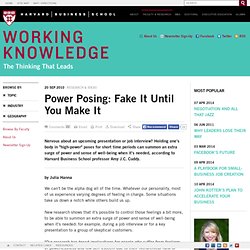
Whatever our personality, most of us experience varying degrees of feeling in charge. Some situations take us down a notch while others build us up. New research shows that it's possible to control those feelings a bit more, to be able to summon an extra surge of power and sense of well-being when it's needed: for example, during a job interview or for a key presentation to a group of skeptical customers. "Our research has broad implications for people who suffer from feelings of powerlessness and low self-esteem due to their hierarchical rank or lack of resources," says HBS assistant professor Amy J.C. Practicing Certain Poses Creates a Sense of Power. When suiting up with that “power tie,” you may also want to strike a pose – a power pose, that is.
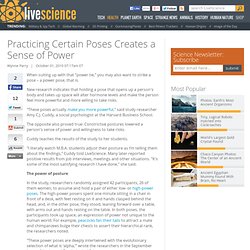
New research indicates that holding a pose that opens up a person's body and takes up space will alter hormone levels and make the person feel more powerful and more willing to take risks. "These poses actually make you more powerful," said study researcher Amy C.J. Cuddy, a social psychologist at the Harvard Business School.
The opposite also proved true: Constrictive postures lowered a person's sense of power and willingness to take risks. Cuddy teaches the results of the study to her students. "I literally watch M.B.A. students adjust their posture as I’m telling them about the findings," Cuddy told LiveScience. Ron Gutman: The hidden power of smiling. Botox Reduces the Ability to Empathize, Study Says. Embodied Emotion Perception. Amplifying and Dampening Facial Feedback Modulates Emotion Perception Accuracy David T.
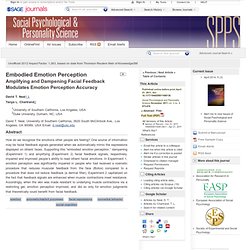
Neal, University of Southern California, 3620 South McClintock Ave., Los Angeles, CA 90089, USA Email: d.neal@usc.edu Abstract How do we recognize the emotions other people are feeling? One source of information may be facial feedback signals generated when we automatically mimic the expressions displayed on others' faces.
Article Notes David T. Neuroanthropology: Evolution and Emotional Embodiment. Albert Einstein Quotes on Spirituality. Carl Jung Quotes - Page 2. Body Quotes, Sayings about the Human Body. Related Quotes Clothing Exercise Health Mind Soul The body is a big sagacity, a plurality with one sense, a war and a peace, a flock and a shepherd.

~Friedrich Nietzsche Take care of your body. It's the only place you have to live. ~Jim Rohn Our own physical body possesses a wisdom which we who inhabit the body lack. Every man is the builder of a Temple called his body, nor can he get off by hammering marble instead. Blood is that fragile scarlet tree we carry within us. When Emotions Make Better Decisions - Antonio Damasio. Malcolm Gladwell - Blink - full show.
Sir Ken Robinson - Educating the Heart and Mind.
Bionik im management_teil 1 von 4_mariapruckner.com.mpg. Management. Dualism (philosophy of mind) 4.3 Introduction to Cartesian Dualism. 4.4 Modern Responses to Dualism. Epiphenomenalism. Epiphenomenalism is a mind-body philosophy marked by the belief that basic physical events (sense organs, neural impulses, and muscle contractions) are causal with respect to mental events (thought, consciousness, and cognition).
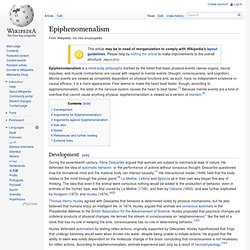
Mental events are viewed as completely dependent on physical functions and, as such, have no independent existence or causal efficacy; it is a mere appearance. Fear seems to make the heart beat faster; though, according to epiphenomenalism, the state of the nervous system causes the heart to beat faster.[1] Because mental events are a kind of overflow that cannot cause anything physical, epiphenomenalism is viewed as a version of monism.[2] Development[edit] During the seventeenth century, Rene Descartes argued that animals are subject to mechanical laws of nature.
He defended the idea of automatic behavior, or the performance of actions without conscious thought. Huxley defended automatism by testing reflex actions, originally supported by Descartes. Adrian G. Emotional intelligence. Emotional intelligence (EI) can be defined as the ability to monitor one's own and other people's emotions, to discriminate between different emotions and label them appropriately, and to use emotional information to guide thinking and behavior.[1] There are three models of EI.
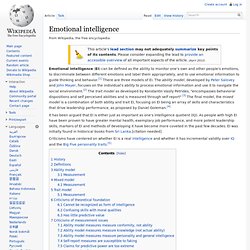
The ability model, developed by Peter Salovey and John Mayer, focuses on the individual's ability to process emotional information and use it to navigate the social environment.[2] The trait model as developed by Konstantin Vasily Petrides, "encompasses behavioral dispositions and self perceived abilities and is measured through self report" [3] The final model, the mixed model is a combination of both ability and trait EI, focusing on EI being an array of skills and characteristics that drive leadership performance, as proposed by Daniel Goleman.[4] It has been argued that EI is either just as important as one's intelligence quotient (IQ). History[edit] Definitions[edit] Ability model[edit] Emotional Intelligence. In 1990, in my role as a science reporter at The New York Times, I chanced upon an article in a small academic journal by two psychologists, John Mayer, now at the University of New Hampshire, and Yale’s Peter Salovey.

Emotional Intelligence or Behaviorial Control? (part 1)